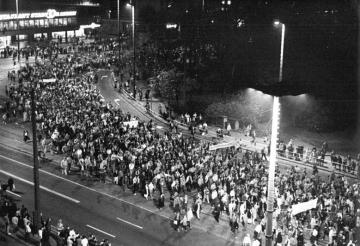What role did ideology and rule play in the everyday lives of GDR citizens? What social and cultural transformation processes can be observed? The topics examined here include, for example, the social history of the SED dictatorship, the transformation of the GDR state party, the history of the BND after 1968 and ideals of beauty.
Social history of the GDR

Monday demonstration in Leipzig on October 23, 1989. photo: Friedrich Gahlbeck, Bundesarchiv Bild 183-1989-1023-022, CC BY-SA 3.0 DE
